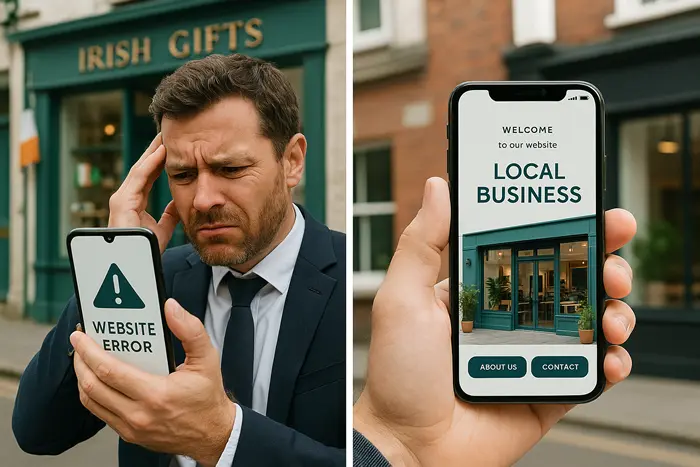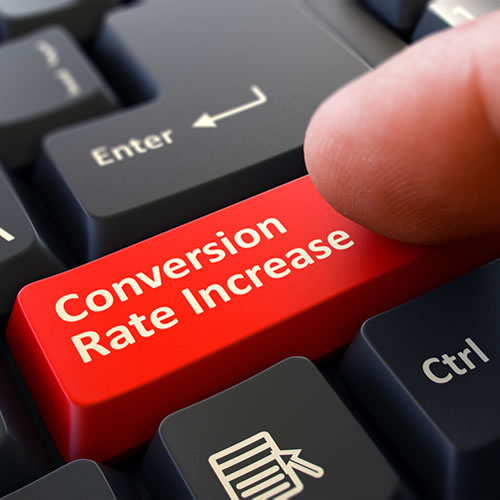Your Basic Implementation Guide
Most Irish business owners recognise the importance of having a website, but many struggle with where to start or what works best for their customers. After fifteen years designing websites for Irish businesses, I’ve seen what separates successful sites from those that get ignored.
Your website needs to work harder than ever before. Irish consumers research everything online now – from finding a local electrician in Galway to choosing a solicitor in Dublin. If your website doesn’t immediately answer their questions or make contacting you simple, they’ll move on to your competitors.
The good news? You don’t need a massive budget or technical expertise to create an effective website. You need to understand what Irish customers actually want and avoid the common mistakes that waste time and money.
Why Professional Design Matters for Irish Businesses
I’ve seen brilliant Irish businesses lose customers due to their websites appearing amateurish or failing to function correctly on mobile devices. Your website is often the first impression people get of your business, especially if they find you through Google rather than word-of-mouth recommendations.
Think about your own browsing habits. When you land on a website that looks outdated or loads slowly, you probably hit the back button within seconds. Your potential customers do precisely the same thing. They make snap judgments about your professionalism based on how your website looks and functions.
Professional design isn’t about flashy graphics or expensive features. It’s about creating a site that builds trust, answers questions quickly, and makes it easy for customers to contact you or buy your products.
Setting Clear Goals Before You Start
Before you think about colours or layouts, figure out what you want your website to accomplish. Are you trying to generate leads for your service business? Sell products online? Establish your expertise in a particular field?
Most Irish SMEs benefit from one of three main approaches. Service businesses typically need lead generation through contact forms and clear information about their service areas. Retail businesses might want e-commerce functionality to sell products across Ireland. Professional services often focus on demonstrating expertise and credibility to attract higher-value clients.
Don’t try to do everything at once. A website that does one thing really well beats one that does five things poorly. You can always add features later as your business grows.
Understanding Your Irish Customers
Irish customers have specific expectations that differ from international markets. They want to see local phone numbers, Irish addresses, and clear information about whether you serve their area. Many prefer calling businesses directly rather than filling out online forms, especially for expensive purchases or essential services.
Regional differences matter too. Customers in Dublin might expect more sophisticated online features, while those in smaller towns often value personal service and local connections more highly. Consider where most of your customers are located and design your site accordingly.
Price transparency is critical in the Irish market. Customers often become frustrated when they can’t find basic pricing information on websites, particularly for services such as accounting, legal work, or home improvements.
Planning Your Site Structure
Start with a simple structure that puts the most critical information front and centre. Your homepage should immediately tell visitors what you do, where you’re located, and how to contact you. Everything else can be organised around these basics.
Most successful Irish business websites include these core pages: services or products, about us (with local credentials), pricing or quotes, and contact information. You might also need case studies, testimonials, or FAQs, depending on your industry.
Avoid creating too many navigation options. If visitors can’t find what they need within a few clicks, they’ll leave. Keep menus simple and use language your customers actually use, not internal business jargon.
Design Elements That Work
Choose colours and fonts that make your business look professional and trustworthy. Avoid trendy design elements that might look dated in a year or two. Your website needs to work for your business for several years, so focus on timeless design principles rather than current fads.
Your logo should work well at different sizes, from large header displays to small mobile icons. Many Irish businesses create logos that look great on business cards but become unreadable when scaled down for website use.
Pay attention to contrast and readability. Remember that many of your customers might be viewing your site on small phone screens or in bright sunlight. If they can’t read your content easily, they won’t stick around.
Mobile Users Come First
More than half of your Irish visitors will use phones to browse your website. Design for mobile first, then adapt for larger screens. This approach ensures your site works well for the majority of your audience.
Mobile users want different things from desktop users. They’re often looking for quick information like phone numbers, addresses, or opening hours. Ensure that these details are easily accessible and tapable on mobile devices.
Test your website on actual phones, not just browser tools that simulate mobile devices. Real-world testing reveals problems you might miss otherwise, like buttons that are too small to tap accurately or text that’s hard to read outdoors.
Content That Connects with Customers
Write like you’re talking to a customer face-to-face, not like you’re filling out a corporate brochure. Use simple language that explains what you do and why it matters to them. Avoid industry jargon unless your customers actually use those terms.
Answer the questions customers ask most often. If you receive the same phone enquiries repeatedly, consider putting those answers prominently on your website. This saves time for both you and your customers.
Include specific details that help customers understand whether you’re right for them. Instead of saying “we serve the Dublin area,” mention specific neighbourhoods or postal codes. Instead of “competitive prices,” give actual price ranges where possible.
Essential Website Features
Contact forms should be short and straightforward. Ask for only the information you actually need to respond effectively. Long forms discourage enquiries, especially on mobile devices where typing is more difficult.
Include multiple ways for customers to contact you. Some people prefer forms, others want to call directly, and some like email. Give them options and make sure your phone number is clickable on mobile devices.
If you’re selling products online, make the buying process as simple as possible. Irish customers abandon online purchases quickly if checkout processes are complicated or if they’re unsure about shipping costs or delivery times.
Security and Trust
SSL certificates are essential for any modern website. They encrypt data between your website and visitors’ browsers, and they’re required for good search engine rankings. Most hosting providers now include SSL certificates, so there’s no excuse not to have one.
Display your business registration details and Irish contact information prominently. Many Irish customers look for these trust signals before doing business with new companies. Include your VAT number if you’re VAT-registered.
Keep your website software updated regularly. Outdated websites are vulnerable to security problems that can damage your reputation and cost money to fix. If you’re not comfortable handling updates yourself, arrange for professional maintenance.
Testing and Improvement
Ask real customers to test your website before you launch it publicly. Watch them try to find information or complete tasks without providing guidance. You’ll discover usability problems you never anticipated.
Monitor your website’s performance using analytics tools. Pay attention to which pages visitors look at most, where they tend to leave your site, and which pages lead to enquiries or sales. This data helps you understand what’s working and what needs improvement.
Don’t assume your website is finished once it goes live. Plan to review and update content regularly, add new information about your services, and respond to customer feedback about the site’s functionality.
Frequently Asked Questions
What should Irish small businesses budget for a professional website? Professional website design typically costs between €2,000 and €8,000, depending on complexity and features. Factor in ongoing costs like hosting (€10-50 monthly), maintenance, and periodic updates.
Do I need a different website for Northern Ireland customers? Usually not. Most Irish businesses can serve customers in both the Republic and Northern Ireland from one website. Just ensure your content addresses both markets appropriately.
What legal requirements apply to Irish websites? Your website must comply with GDPR for data protection and include proper business registration details. E-commerce sites have additional requirements for terms and conditions, returns policies, and consumer rights information.
How long does website development typically take? Most business websites take 6-10 weeks from start to finish, including content creation, design, development, and testing. Complex e-commerce sites or custom functionality might take longer.
Should I prioritise search engine optimisation during design? Yes, it’s much easier to build SEO into a website from the start than to add it later. Focus on site structure, page loading speed, and mobile performance during the design phase.
Valuable Resources for Website Planning
The Web Content Accessibility Guidelines provide comprehensive standards for creating websites that work for all users, including those with disabilities. Following these guidelines makes your website more usable for everyone.
Google’s Core Web Vitals documentation explains the performance metrics that affect search rankings. Understanding these requirements helps ensure your website meets modern user expectations.
Enterprise Ireland offers digital marketing resources specifically for Irish businesses, including guidance on website development and online marketing strategies.
Getting Started with Your Website Project
Creating an effective business website requires careful planning and realistic expectations about timeframes and costs. Start by clearly defining what you want to achieve and who you’re trying to reach.
Consider working with a local web designer who understands the Irish market and can provide ongoing support after your site launches. Look for designers who show examples of work for businesses similar to yours and who can explain their approach in plain English.
Remember that your website is an investment in your business’s future, not a one-time expense. Budget for ongoing maintenance and improvements that keep your site current and effective for Irish customers.
Ready to discuss your website needs? Our web design services help Irish businesses create effective online presences that generate real results. We also offer ongoing maintenance to keep your website secure and up-to-date.
Contact us to discuss how professional web design can help your Irish business reach more customers online.
Last updated: August 2025







